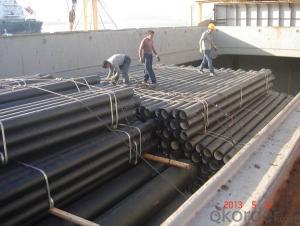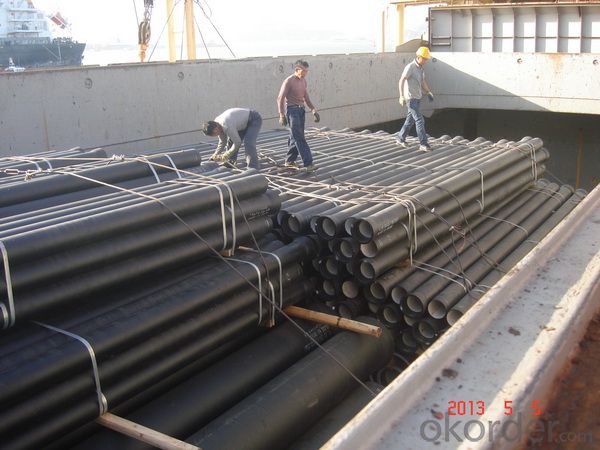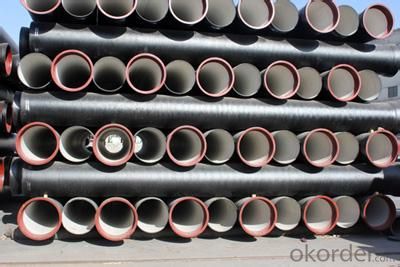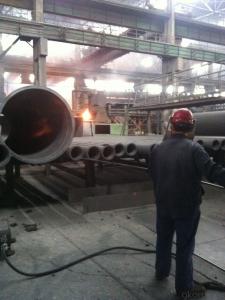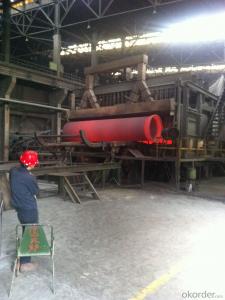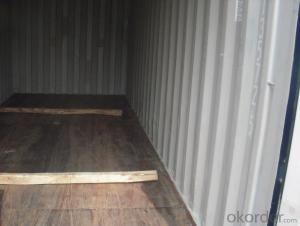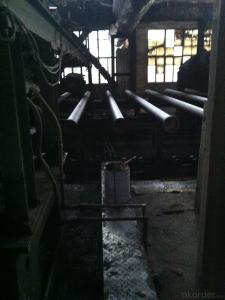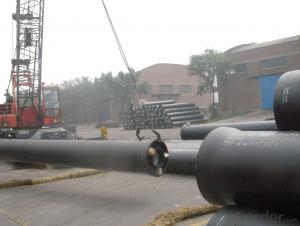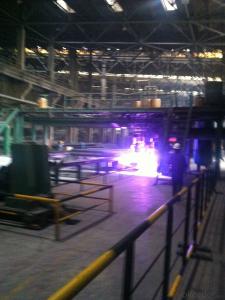DUCTILE IRON PIPES AND PIPE FITTINGS K7 CLASS DN1200
- Loading Port:
- Tianjin
- Payment Terms:
- TT OR LC
- Min Order Qty:
- 22 pc
- Supply Capability:
- 3000 pc/month
OKorder Service Pledge
OKorder Financial Service
You Might Also Like
Material : Ductile Cast Iron
Size Range : DN 80mm to DN 2000mm
Unit Effective Length : 6m or 5.7m
Manufacture Standard: ISO 2531:1998/ EN 545:2006/EN 598:2007
Annual capacity : 200,000 tons
Coating Exterior: Zinc 130g/m2 according to ISO 8179-1 and bitumen coating 70 microns.
Cement Interior: Portland Cement/ High Alumina Cement/ Sulphate Resisting Cement Lining according to ISO 4179
Special requirements on external coating and internal lining can be applied
We also provide accessories such as SBR/EPDM rubber gaskets, lubricant paste, pipe caps, PE sleeves, etc.
Additional Parts:
Each pipe is strictly inspected according to related standard to ensure permanently high performance.
Easy Installation at site and service free for life
Long Service Lifespan
Quotation will arrive you within 24hours once we get your inquiry.
We guarantee offering you a competitive price.
A copy of original inspection reports of pipes will be offered after shipment.
Photos of loading process will be sent to the customer after shipment effect.
We will follow-up the delivery progress after shipment effect and update to the customer on weekly basis.
- Q: Are ductile iron pipes suitable for use in irrigation canals?
- Yes, ductile iron pipes are suitable for use in irrigation canals. Ductile iron pipes are known for their strength, durability, and resistance to corrosion, making them ideal for transporting water in irrigation systems. They can handle high-pressure flows and are capable of withstanding the challenging conditions of irrigation canals.
- Q: Can ductile iron pipe be used for hot water applications?
- Yes, ductile iron pipe can be used for hot water applications. Ductile iron pipe is known for its strength, durability, and high resistance to corrosion, which makes it suitable for a wide range of applications, including hot water systems. It can handle high temperatures and pressure, making it a reliable choice for transporting hot water. Additionally, ductile iron pipe's thermal conductivity properties allow for efficient heat transfer, ensuring that hot water is delivered effectively throughout the system. Therefore, when considering materials for hot water applications, ductile iron pipe is a suitable option.
- Q: Can ductile iron pipe be used for directional drilling?
- Yes, ductile iron pipe can be used for directional drilling. It is a strong and durable material that can withstand the stresses and forces encountered during directional drilling operations. Its flexibility and resistance to damage make it a suitable choice for this application.
- Q: Do ductile iron pipes require internal linings for potable water?
- Internal linings are not required for potable water in ductile iron pipes. Ductile iron, a type of iron that has been strengthened and made more flexible, is commonly used in water distribution systems due to its durability and resistance to corrosion. Unlike cast iron or steel, ductile iron pipes have a protective cement-mortar lining. This lining acts as a strong barrier against corrosion and prevents the release of harmful substances into the water. It is applied during the manufacturing process and is designed to withstand the corrosive properties of potable water, eliminating the need for internal linings. Furthermore, the smooth surface of ductile iron pipes ensures the quality and flow of water without the necessity of additional linings.
- Q: Can ductile iron pipes be used for wastewater pumping stations?
- Yes, ductile iron pipes can be used for wastewater pumping stations. Ductile iron pipes have excellent strength and durability, making them suitable for transporting wastewater and handling the high pressures and corrosive nature of the sewage. Additionally, ductile iron pipes have a smooth interior surface, which prevents clogs and allows for efficient flow of wastewater. These pipes are also resistant to damage from external factors such as soil movement or heavy traffic, making them a reliable choice for wastewater pumping stations.
- Q: What are the different joint types available for ductile iron pipe?
- There are several different joint types available for ductile iron pipe, each with its own advantages and applications. The most common joint types used in ductile iron pipe installations are: 1. Push-on Joint: This joint type is the most widely used and involves a rubber gasket that is placed into a groove on the spigot end of the pipe. The pipe is then pushed into the bell end of the adjoining pipe, creating a watertight seal. Push-on joints are quick and easy to install, making them ideal for applications that require a fast and efficient installation process. 2. Mechanical Joint: This joint type involves the use of a gland and follower gasket that is compressed between the spigot end of one pipe and the bell end of the adjoining pipe. A series of bolts and nuts are used to secure the joint, ensuring a tight and secure connection. Mechanical joints provide a high level of joint integrity and are often used in applications where higher pressures or heavy loads are expected. 3. Flanged Joint: Flanged joints involve the use of flanges on the ends of the pipes, which are then bolted together using gaskets to create a leak-proof connection. Flanged joints are commonly used in applications where the pipe needs to be easily disconnected and reconnected, such as in pump stations or at valve connections. 4. Restrained Joint: Restrained joints are designed to prevent the pipes from separating under high internal pressures or external forces. These joints typically include a mechanical joint with additional restraining devices such as harnesses, rods, or thrust blocks. Restrained joints are commonly used in applications where there is a risk of pipe movement or where stability is critical. It's important to note that the selection of joint type depends on various factors such as the application, operating conditions, and project requirements. Consulting with a professional engineer or pipe manufacturer is recommended to determine the most suitable joint type for a specific ductile iron pipe installation.
- Q: What is the expected pressure rating for ductile iron pipes?
- The pressure rating for ductile iron pipes can differ based on factors like pipe diameter, wall thickness, and specific application. In general, ductile iron pipes are built to endure high-pressure situations. They are frequently utilized in water and wastewater systems, where they can normally manage pressures ranging from 150 psi to 350 psi or more. To ensure safe and dependable operation, it is crucial to refer to the manufacturer's specifications or relevant industry standards for precise pressure ratings based on pipe size and application.
- Q: What is the average diameter range of ductile iron pipes?
- The average diameter range of ductile iron pipes is typically between 3 inches to 64 inches.
- Q: What do ductile iron pipes need to connect with three? Can I contact it directly?
- Old craft1. dozen to lead lead; cut into strips, with a file play in the interface2. use expanded cement with asbestos3 use the asphalt
- Q: What are the interface forms of ductile iron pipes? The best drawings are available. Thank you
- There are many kinds of ductile iron pipe interfaces, and the T type interface (sliding type) flexible interface is famous for its fast installation and simple installation.
Send your message to us
DUCTILE IRON PIPES AND PIPE FITTINGS K7 CLASS DN1200
- Loading Port:
- Tianjin
- Payment Terms:
- TT OR LC
- Min Order Qty:
- 22 pc
- Supply Capability:
- 3000 pc/month
OKorder Service Pledge
OKorder Financial Service
Similar products
Hot products
Hot Searches
Related keywords
